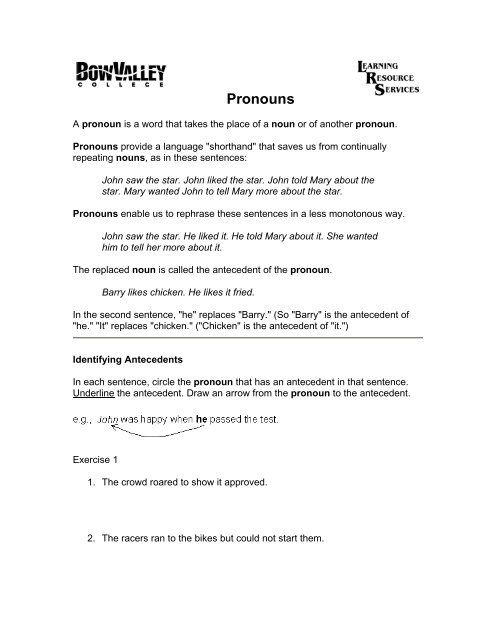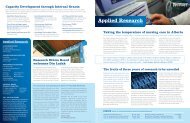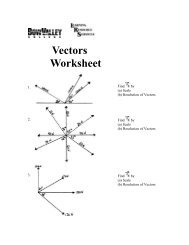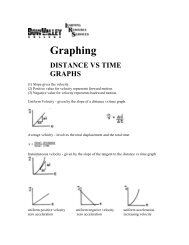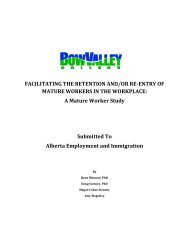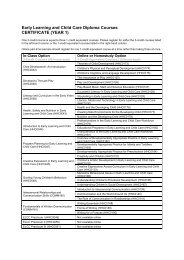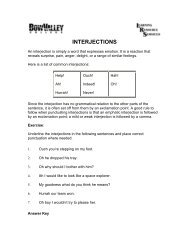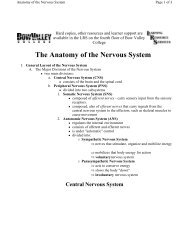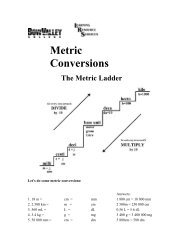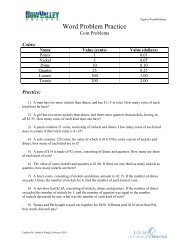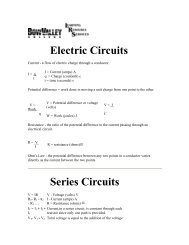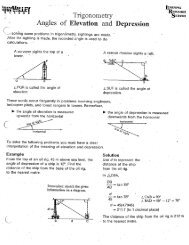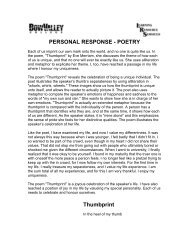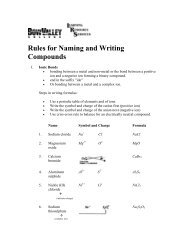Pronouns - Bow Valley College
Pronouns - Bow Valley College
Pronouns - Bow Valley College
You also want an ePaper? Increase the reach of your titles
YUMPU automatically turns print PDFs into web optimized ePapers that Google loves.
<strong>Pronouns</strong><br />
A pronoun is a word that takes the place of a noun or of another pronoun.<br />
<strong>Pronouns</strong> provide a language "shorthand" that saves us from continually<br />
repeating nouns, as in these sentences:<br />
John saw the star. John liked the star. John told Mary about the<br />
star. Mary wanted John to tell Mary more about the star.<br />
<strong>Pronouns</strong> enable us to rephrase these sentences in a less monotonous way.<br />
John saw the star. He liked it. He told Mary about it. She wanted<br />
him to tell her more about it.<br />
The replaced noun is called the antecedent of the pronoun.<br />
Barry likes chicken. He likes it fried.<br />
In the second sentence, "he" replaces "Barry." (So "Barry" is the antecedent of<br />
"he." "It" replaces "chicken." ("Chicken" is the antecedent of "it.")<br />
Identifying Antecedents<br />
In each sentence, circle the pronoun that has an antecedent in that sentence.<br />
Underline the antecedent. Draw an arrow from the pronoun to the antecedent.<br />
Exercise 1<br />
1. The crowd roared to show it approved.<br />
2. The racers ran to the bikes but could not start them.
3. A mechanic kicked a cycle and dented it.<br />
4. The official with the flag waved it to begin the race.<br />
5. The cycle shook painfully when it hit the row of ruts.<br />
6. The driver, thrown into the air, was hurt when the bike landed on him.<br />
7. Witnesses to the accident said it was spectacular.<br />
8. The track was filled with ruts, and they were dangerous.<br />
9. The novice could not avoid them as he turned.<br />
10. The window broke. Mr. Watkins fixed it.<br />
11. Polly and Jim are here. They came by plane. It was late.<br />
12. If Mark comes, tell him to call Sarah at the office. She is expecting him.
Types of <strong>Pronouns</strong><br />
1 st person I, me we, us<br />
2 nd person you you<br />
3 rd person he, she, it, they,<br />
him, her them<br />
First Person is the speaker; Second Person is the person spoken to; and Third<br />
Person is the person or thing spoken about.<br />
Circle the personal pronouns in the following sentences.<br />
Exercise 2<br />
S<br />
i<br />
n<br />
g<br />
u<br />
l<br />
a<br />
r<br />
P<br />
l<br />
u<br />
r<br />
a<br />
l<br />
1. John lost the ball and could not find it.
2. He looked everywhere for it.<br />
3. It had rolled under the cushions.<br />
4. They were covering it so he could not see it.<br />
5. Eventually Alice lifted them and she found it.<br />
Possessive <strong>Pronouns</strong> show ownership or possession of something.<br />
S<br />
i<br />
n<br />
g<br />
u<br />
l<br />
a<br />
r
Examples:<br />
1 st person mine ours<br />
2 nd person yours yours<br />
3 rd person his, hers, its theirs<br />
1. Don’t touch that book. It’s mine.<br />
2. Yours is better than theirs.<br />
Note: Possessive pronouns cannot be used before nouns.<br />
P<br />
l<br />
u<br />
r<br />
a<br />
l<br />
e.g., his horse, her pencil, their house.<br />
In these cases, the possessive words (his, her, their) are<br />
adjectives, not pronouns.<br />
In the following sentences, circle the possessive pronouns, cross out any<br />
possessive adjectives (e.g., their dog), and underline any personal pronouns.<br />
Exercise 3<br />
1. Is this yours? Or is it mine?<br />
2. Ours was lost, but his was found. Was theirs lost, too?<br />
3. Their team is first in the league, and ours is last.
4. My doctor presented me with a book. It used to be hers.<br />
5. The green book is missing a cover; the blue book still has its.<br />
Indefinite pronouns are pronouns that do not define or stand for a particular<br />
person or thing.<br />
Some common indefinite pronouns are all, each, neither, either, one, everyone,<br />
several, some, other, another, both, none, many, anything, nothing, few.<br />
Note: Indefinite pronouns cannot be used before nouns.<br />
e.g., many people, either boy, some houses.<br />
In these cases, the indefinite words (many, either, some) are<br />
adjectives, not pronouns.<br />
In the following sentences, circle indefinite pronouns. Cross out indefinite<br />
adjectives (some people. Underline personal pronouns.<br />
Exercise 4<br />
1. Some of the tigers were donated by Mrs. Vanderbilt.<br />
2. Anything you can do, I can do better.<br />
3. Few sang on key and one missed a beat.
4. Someone asked if everyone had several ideas.<br />
5. He was heartbroken to find out that she loved another.<br />
6. Nothing has been done properly.<br />
7. I invited both John and George, but neither came.<br />
8. Each blamed the other.<br />
Numerical pronouns show a specific number of the antecedent noun.<br />
Common numerical pronouns are one, two, three, etc. and first, second, third,<br />
etc.<br />
e.g., Jane bought tomatoes, but two were bad.<br />
Paul was the first to finish.<br />
* The word one is a numerical pronoun if the antecedent<br />
noun has been specifically identified. If the antecedent noun is not<br />
identified, the word one is an indefinite pronoun (see above<br />
section).<br />
Note: Numerical pronouns cannot be used before nouns.<br />
Exercise 5<br />
e.g., three people, the second day.<br />
In these cases, the numerical words (three, second) are<br />
adjectives, not pronouns.
In the following sentences, circle numerical pronouns, cross out numerical<br />
adjectives, (three people), and underline personal pronouns.<br />
1. Of the ten people who were invited, only four came.<br />
2. Three boys ran the race: the first was Paul; the second was Alan; and the<br />
third was Ricky.<br />
3. One the tenth day of the vacation, five of them visited New York.<br />
4. The Earth is surrounded by millions of stars.<br />
5. The first girl in the class is Elenor; the second is Anna.<br />
Demonstrative <strong>Pronouns</strong><br />
This group (this, that, these, and those) "demonstrate" or point out a specific<br />
person or thing.<br />
This is my oak chopping board.<br />
Those are the muxhrooms I like.<br />
Note: You must double-check all four words. If they come before nouns, they<br />
are adjectives, not pronouns: this spinach, those apples.<br />
Use this (singular) and these (plural) for things close to you and that (singular)<br />
and those (plural) for things farther away.
In the following sentences, circle the demonstrative pronouns, cross out<br />
demonstrative adjectives and underlinepersonal pronouns.<br />
Exercise 6<br />
1. Give me that!<br />
2. If you did this, you’re in trouble.<br />
3. If that is what you believe, this conversation is pointless.<br />
4. These are a good buy; those are a waste of money.<br />
5. This is one of those days!<br />
Interrogative <strong>Pronouns</strong><br />
Interrogative pronouns are used to ask questions. Who, whose, whom, which,<br />
and what are sometimes used as interrogative pronouns.<br />
e.g., What did you say? In that sentence, what is an interrogative<br />
pronoun.<br />
Note: Interrogative pronouns cannot be used before a noun.<br />
e.g., Whose hat, which boy?<br />
In these cases the interrogative words (whose, which) are<br />
adjectives, not pronouns.<br />
In the following sentences, circle the interrogative pronouns, cross out<br />
interrogative adjectives (whose hat), and underline personal pronouns.<br />
Exercise 7
1. What am I supposed to do about it?<br />
2. Who is going to be there when I arrive?<br />
3. Which of the plants do you want me to take to them?<br />
4. Whose work was good and whose was bad?<br />
5. Whom did you give it to when you were through with it?<br />
6. Who’s coming to dinner?<br />
7. Which house have you decided to buy?<br />
Reflexive <strong>Pronouns</strong><br />
These pronouns are the personal pronouns (my, your, him, her, its, our, and<br />
them) with a -self or -selves ending. Their special use is to refer action to<br />
another noun or pronoun in the sentence. They can also be used simply to add<br />
emphasis.<br />
Peeling potatoes, I cut myself.<br />
Jack himself prepared the meal.
Do not use a reflexive pronoun when its "referring" quality is not needed.<br />
Example: Do not say, "Please give the money to Paul or myself."<br />
In the following sentences, circle the reflexive pronouns and underline<br />
personal pronouns.<br />
Exercise 8<br />
I<br />
1. Peter gave himself a party.<br />
2. Gail made herself a dress out of the material you gave her.<br />
3. The car rolled by itself down the hill.<br />
4. We take ourselves very seriously at Plainview High School.<br />
5. You must demand more of yourselves if you expect to be successful.<br />
Summary Table to Types of <strong>Pronouns</strong><br />
Personal Possessive Indefinite Numerical Demonstrative Interrogative Reflexive<br />
you<br />
he<br />
she<br />
me<br />
you<br />
him<br />
her<br />
mine<br />
yours<br />
his<br />
hers<br />
all<br />
some<br />
none<br />
another<br />
one<br />
two<br />
three<br />
first<br />
this<br />
that<br />
these<br />
those<br />
who<br />
whom<br />
whose<br />
which<br />
what<br />
myself<br />
yourself<br />
himself<br />
herself
it<br />
we<br />
you<br />
they<br />
it<br />
us<br />
you<br />
them<br />
its<br />
ours<br />
yours<br />
theirs<br />
someone<br />
anyone<br />
everyone<br />
nobody<br />
nothing<br />
either<br />
neither<br />
much<br />
anybody<br />
everything<br />
something<br />
few<br />
many<br />
several<br />
others<br />
one<br />
second<br />
third<br />
Note: In the above table, the lists of indefinite and numerical pronouns do<br />
not include all of these types of pronouns.<br />
Exercise 9<br />
In the blank table following this exercise, write all the pronouns in these<br />
sentences, placing each in its correct column according to type.<br />
e.g., Who is it? Who would be written in the Interrogative column.<br />
1. Mary herself will prepare the food.<br />
2. He is one of my best friends.<br />
3. I spoke to him yesterday.<br />
4. I believe this pen is his; it is not mine.<br />
5. I think these are ours.<br />
itself<br />
ourselves<br />
yourselves<br />
themselves
6. Which of these dresses do you like?<br />
7. These flowers are more expensive than those.<br />
8. They built this house by themselves.<br />
9. Anybody can do that.<br />
10. I saw something in the corner.<br />
11. It’s mine!<br />
12. Your sister asked me which I liked better.<br />
13. All of them came to the party.<br />
14. Who was at the door?<br />
15. You come to our house and then we will all go to theirs.<br />
16. You should not blame yourself for that mistake.<br />
17. Either of the runners is good enough to win.<br />
18. Moira was the first to finish.<br />
19. What would you say if I told you she made one by herself?<br />
20. On the ninth day, the egg hatched.<br />
Personal Possessive Indefinite Numerical Demonstrative Interrogative Reflexive<br />
Ex. Who<br />
1.<br />
2.<br />
3.<br />
4.<br />
5.<br />
6.<br />
7.<br />
8.
9.<br />
10.<br />
11.<br />
12.<br />
13.<br />
14.<br />
15.<br />
16.<br />
17.<br />
18.<br />
19.<br />
20.<br />
Answer Key (Words that you were to circle are shown in italics)<br />
Exercise 1<br />
1. crowd it<br />
2. bikes them<br />
3. cycle it<br />
.
4. flag it<br />
5. cycle it<br />
6. driver him<br />
7. accidentit<br />
8. ruts they<br />
9. novice he<br />
10. window it<br />
11. Polly & Jim they plane it<br />
12. Mark him Sarah she Mark him<br />
Exercise 2<br />
1. it<br />
2. it He<br />
3. It<br />
4. They, it, it he<br />
5. them, she, it<br />
Exercise 4<br />
1. Some<br />
2. Anything you I<br />
3. Few one<br />
4. someone everyone several<br />
5. He she another<br />
6. Nothing<br />
7. I both neither<br />
8. Each other<br />
Exercise 6<br />
1. me that<br />
2. you this you<br />
3. that you this<br />
4. These those<br />
5. This those<br />
Exercise 3<br />
1. yours it mine<br />
2. ours his theirs<br />
3. Their ours<br />
4. My me It hers<br />
5. its<br />
Exercise 5<br />
1. ten four<br />
2. Three first second third<br />
3. tenth five them<br />
4. millions<br />
5. first second<br />
Exercise 7<br />
1. What I it<br />
2. Who I<br />
3. Which you me them<br />
4. whose whose<br />
5. Whom it you it<br />
6. Who
Exercise 8<br />
1. himself<br />
2. herself you her<br />
3. itself<br />
4. We ourselves<br />
5. You yourselves you<br />
7. Which you<br />
Personal Possessive Indefinite Numerical Demonstrative Interrogative Reflexive<br />
1. herself<br />
2. one<br />
3. I, him<br />
4. I, it his, mine<br />
5. I ours these<br />
6. you which<br />
7. those<br />
8. they themselves<br />
9. anybody that<br />
10. I something<br />
11. it mine<br />
12. me, I which<br />
13. them all<br />
14. who
15. you, we theirs all<br />
16. you yourself<br />
17. either<br />
18. first<br />
19. you, I,<br />
you, she<br />
20.<br />
one what herself


